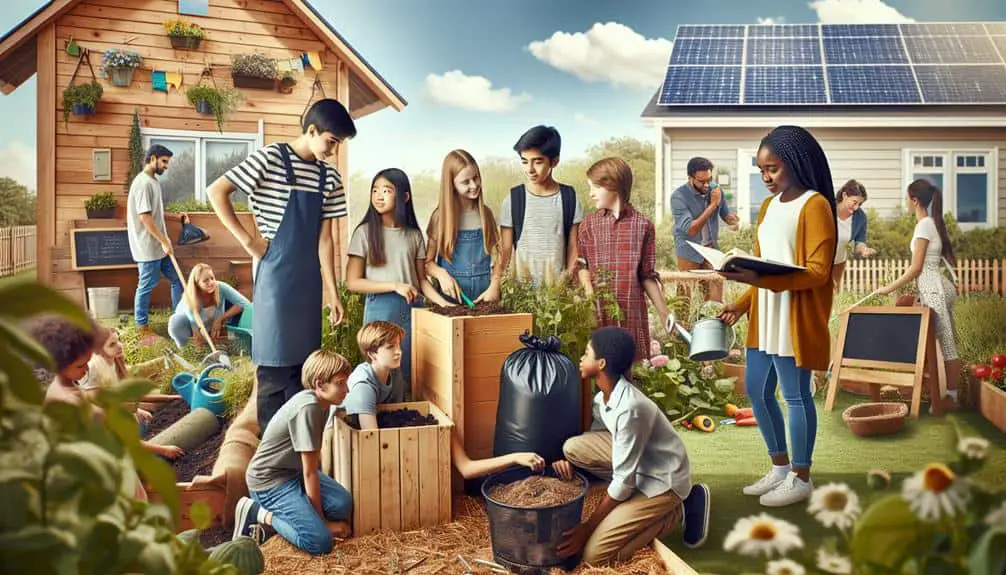Begin an enriching journey with collaborative eco projects crafted for homeschoolers. Immerse yourself in sustainable initiatives like establishing a garden, constructing solar ovens, or installing rainwater harvesting systems. Discover interests, formulate action plans, and cooperate to make a difference. Participate in workshops, utilize resources, and engage with experts for a deeper comprehension of environmental issues. These projects provide experiential learning, solidarity, personal development, and motivation for the future. Commence your eco adventure today and unleash the potential of hands-on sustainability projects that shape a greener tomorrow.
Key Points
- Enhancing homeschooling with hands-on eco learning experiences and community engagement.
- Implementing sustainable projects like gardens, upcycling, solar ovens, and rainwater harvesting.
- Developing detailed action plans and utilizing available resources for eco initiatives.
- Accessing online workshops, guides, lesson plans, and activities for eco-friendly practices.
- Cultivating personal growth, unity, and commitment to a sustainable lifestyle for a greener future.
Benefits of Co-Op Eco Projects
Engaging in Co-Op Eco Projects can greatly enhance your homeschooling experience, offering a hands-on approach to learning about sustainability and environmental stewardship. These projects provide a unique opportunity for community engagement, where you and your peers can come together to make a positive impact on the environment while learning valuable lessons about conservation and eco-friendly practices.
By participating in Co-Op Eco Projects, you not only gain practical knowledge but also develop a deep sense of responsibility towards the planet. Through environmental education embedded in these projects, you learn about the interconnectedness of ecosystems and the importance of preserving natural resources for future generations.
The beauty of Co-Op Eco Projects lies in their ability to foster a sense of unity and purpose within your homeschooling community. Together, you can work towards common goals, whether it's creating a community garden, organizing a recycling initiative, or participating in local clean-up efforts. These projects not only enrich your homeschooling curriculum but also instill in you a lifelong commitment to environmental stewardship.
Types of Eco Projects
Explore a variety of engaging and impactful eco projects that can elevate your homeschooling experience and deepen your understanding of sustainability and environmental conservation. Engaging in hands-on learning activities is a fantastic way to instill a sense of responsibility towards the environment in homeschoolers.
One exciting project you can undertake is creating a sustainable garden where you learn about organic gardening, composting, and the importance of biodiversity. Another hands-on project could involve upcycling old materials to create new and useful items, promoting the concept of reuse and waste reduction.
Moreover, building a solar oven or a rainwater harvesting system are excellent examples of eco projects that not only teach you about sustainable solutions but also allow you to directly contribute to reducing your ecological footprint. These projects offer practical lessons in renewable energy and water conservation, showcasing how individuals can make a positive impact on the environment.
Setting Up Eco Initiatives
Embark on a journey to implement impactful eco initiatives in your homeschooling environment by proactively establishing sustainable projects that align with your values and aspirations for a greener future. Engaging in collaborative learning experiences focused on sustainability practices can cultivate a deeper understanding of environmental issues and empower homeschoolers to make a positive impact. Here are four essential steps to set up eco initiatives:
- Identify Areas of Interest: Encourage brainstorming sessions to pinpoint specific eco-friendly projects that resonate with the group's passions and goals.
- Develop an Action Plan: Create a detailed roadmap outlining the project's objectives, timeline, required resources, and assigned responsibilities to guarantee a structured approach.
- Utilize Available Resources: Tap into online platforms, local community organizations, and educational materials to gather information and support for your initiatives.
- Foster Collaboration: Emphasize the importance of teamwork, communication, and shared decision-making to maximize the impact of your sustainability initiatives through collective effort.
Resources and Tools
Discover a treasure trove of resources and tools that will empower you to bring your eco initiatives to life in your homeschooling environment. Online workshops can be a fantastic way to gain new knowledge and skills in sustainable living practices. These workshops often cover a wide range of topics such as composting, gardening, renewable energy, and eco-friendly crafts. They provide a platform for connecting with experts and like-minded individuals who share your passion for environmental conservation.
Educational materials are another invaluable resource for homeschooling eco projects. There are numerous websites, books, and online courses that offer detailed guides on various eco-friendly practices. From lesson plans on recycling and reducing waste to hands-on activities that teach about biodiversity and conservation, these materials can enrich your curriculum and make learning about sustainability engaging and fun for your homeschoolers.
Impact and Reflections
Explore the profound impact of your eco projects and contemplate the transformative journey towards sustainable living in your homeschooling environment. Engaging in eco projects not only benefits the environment but also fosters a sense of responsibility and stewardship in your homeschooling community. Reflect on the changes you've implemented and the lessons learned along the way.
Here are some key aspects to ponder:
- Educational Impact: Your eco projects provide hands-on learning experiences that go beyond textbooks, allowing for a deeper understanding of environmental issues.
- Community Engagement: By involving your homeschooling community in these projects, you create a sense of unity and shared purpose towards sustainability.
- Personal Growth: Reflect on how these projects have influenced your own beliefs and behaviors, encouraging personal growth and a commitment to eco-conscious living.
- Long-Term Effects: Consider the lasting impact of your eco projects, inspiring future generations to continue the journey towards a more sustainable lifestyle.
Through active engagement and reflection, your eco projects can truly make a difference, shaping a greener future for all.




